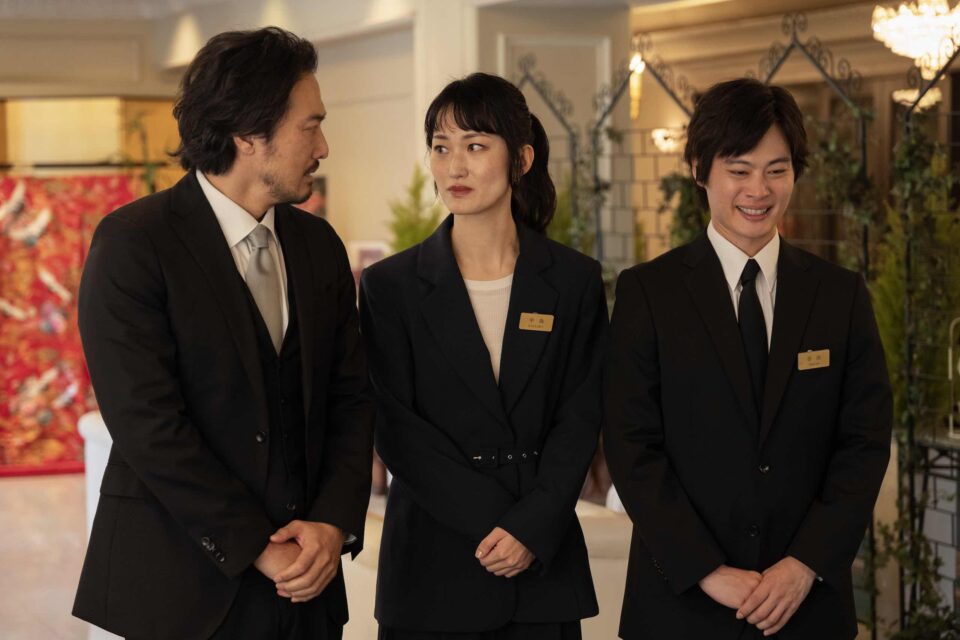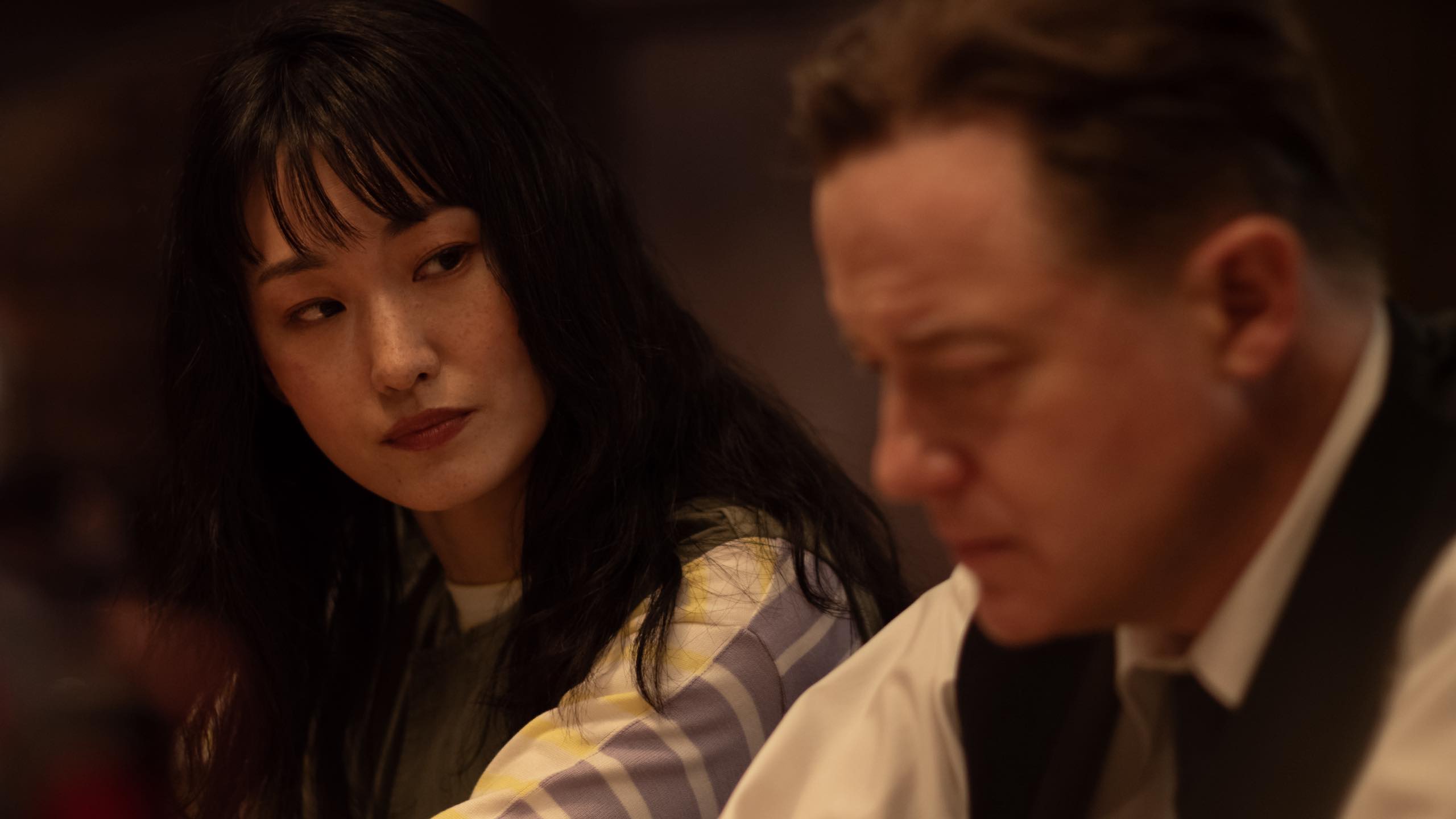Dealing with themes of grief, loneliness, and the search for purpose, Hikari’s new film Rental Family was among the most talked-about movies of the film festival season. It follows a struggling American actor played by Brendan Fraser who lands a job with a Japanese agency to play stand-in roles in strangers’ lives. As he immerses himself in his clients’ worlds, the lines between performance and reality become increasingly blurred. It’s heartwarming and heartbreaking in equal measures, and it reflects the power of human connection.
Starring alongside Brendan Fraser is Japanese actress and writer Mari Yamamoto, who plays an employee at the rental family agency. Previously known for roles in Pachinko and Monarch: Legacy of Monsters, Yamamoto brings her character to life with a rich and honest portrayal of finding purpose in modern society. Below, we discuss how director Hikari gave Yamamoto the freedom to fully explore her role, as well as the story’s deep compassion and resonance.
What initially drew you to this movie?
I was really drawn to this character who’s deeply compassionate. Of course, it wasn’t just the character—the entire script was so multi-layered. It talks about themes of grief and loss, but then finding connections and being there for somebody and somebody being there for you. For my character, there’s an arc of finding the strength to stand up for what’s right and being able to realize that taking care of others is what gives us purpose. But you need to be able to protect yourself and take care of yourself first in order to be able to be there for other people.
What makes Hikari such a unique filmmaker, especially in the way that she tells this story?
I’ve wanted to work with her for a really long time. I’ve loved everything she’s ever made. I worked on Tokyo Vice on the writing team and she directed my favorite episodes. I think what’s really special about her is that her characters are often people on the fringes of society, but she brings them to the center of her stories. She does it with so much compassion, love, and care. If you meet her, you really understand that. Her name means “light,” and literally, that’s where she operates from. She’s the most non-judgmental person I’ve ever met, and that really shows in her work with the way she writes these characters and directs you, too. She’s just a lover of human beings.
“What’s special about [Hikari] is that her characters are often people on the fringes of society, but she brings them to the center of her stories. She does it with so much compassion, love, and care.”
Did you have any conversations with her before filming that gave you a new perspective on the movie or your character?
That’s another great [thing about working with her] and Stephen [Blahut, the film’s co-writer and executive producer]. They’ve done so many iterations of the story—they’ve literally explored all of the characters from birth to now to where they’re going. Any questions I had were answered with, “Well, when she was seven…” It was incredibly detailed and deep, and there were some things in the script that didn’t make the cut of the final product, but inform so much of the characters. We shot some of the scenes that aren’t in the final product that really inform every choice my character makes; it’s the foundation of my character, which she gave me and other actors. That gave depth to all of the other scenes you end up seeing onscreen.
That’s fascinating, because we only see a snapshot of these characters’ lives in the movie.
A lot of the clients that we see are vignettes, right? But even for these tiny moments, we had so much backstory filled in. Hikari was super collaborative—you could bring anything in and she would be like, “I love that, let’s try it.” She was just so willing to try everything, which is such a luxury when you work on a set and it’s not like, “This is the only way.” It’s fluid and fun and I think everybody felt that freedom.

Takehiro Hira, Mari Yamamoto, and Bun Kimura in RENTAL FAMILY. Photo by James Lisle/Searchlight Pictures. © 2025 Searchlight Pictures. All Rights Reserved.
Did you speak to any people in Japan who were operating these types of companies?
I went with Takehiro Hira, who plays the boss of the rental family company, to interview a company that operates this business. The people we met don’t call themselves a “rental family” business—they actually market themselves as the “All-Woman Handyman Company.” The threshold is so much lower than asking somebody to be your companion; it’s just calling them up and being like, “Can you come and change my AC filter?” Or, “I’m in the hospital and I don’t have anybody to bring me something from home and I really need this.” It was interesting that the entry point could be anything, but ultimately, what all these people wanted was companionship and emotional support. Women naturally take on a lot of the emotional labor in daily life and they’re very equipped to do so.
Was there anything about these companies that surprised you?
This year, I’ve read that a lot of teenage girls are renting middle-aged men, because Japanese dads work such long hours and it’s so often the case that they don’t get to spend time with their kids. These teenagers are seeking out that father figure in these rental services, because they just want an older man to give them sage life advice. It’s sort of heartbreaking—but also tender and comforting—that these girls turn to these services to look for that. In our film, the hope is that asking for these services will make you reflect upon what you need to do to change your life, and then hopefully you’re able to take the steps toward what you really want in life. The hope is that these girls are finding answers and also finding the courage to reach out to their own dads.
“The hope is that asking for these services will make you reflect upon what you need to do to change your life, and then hopefully you’re able to take the steps toward what you really want in life.”

Mari Yamamoto, Photo by Catie Laffoon
Was there a particular scene that resonated with you the most?
The scene that really hit me—which might go over people’s heads—is the scene between Philip [Fraser] and Aiko [Yamamato] when they’re talking in the ramen shop and Aiko is really upset with him. She says to him, “You’re just a gaijin [foreigner/outsider], you’ll never understand how things work here.” The way Brendan delivers that line, “Japan is my home now and I want to understand,” it really hit me. I’m also an immigrant in the US and I’m trying to make a home somewhere else, and so often we dismiss somebody’s efforts to fit into a place. I thought about the times when I’ve maybe done that to people. I hope people learn something from that. Phillip is really respectful and trying to learn, and that’s all we can ever do, right?
I’m glad you mentioned that scene, because that really resonated with me, too. There are different aspects of Japanese culture that outsiders, like myself, might not understand, but want to learn.
When it comes to Japan, there are so many films and shows that will say, “You’ll never understand what it’s like, we are special.” And then a wall is put up. The point is, let’s not do that. Especially now—it seems like anti-foreigner rhetoric is rampant in Japan. I know people come with good intentions and it’s not always people trying to take advantage of what Japan has to offer. We all need to have that mindset, because we’re all moving around and visiting. FL







